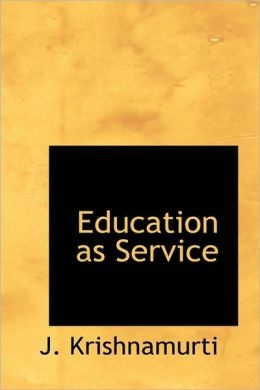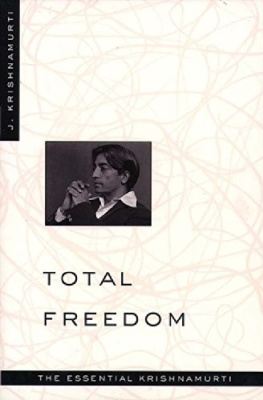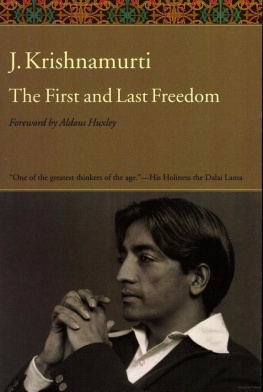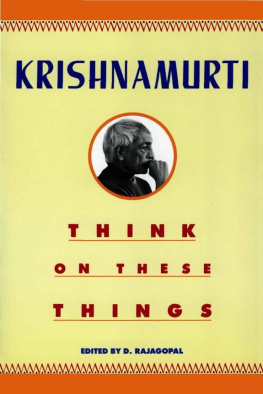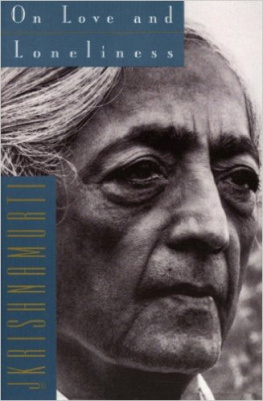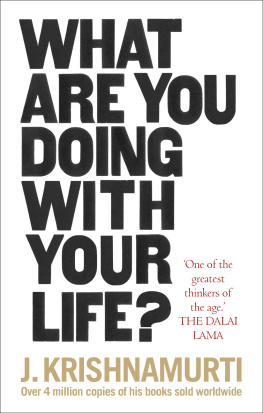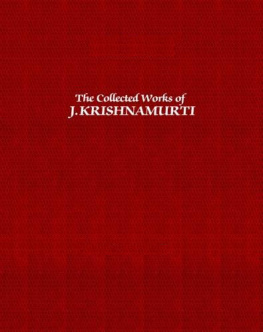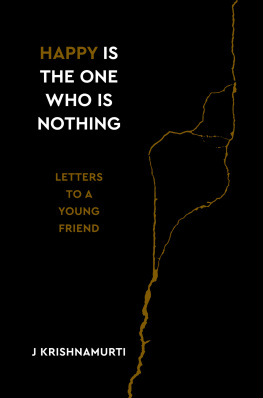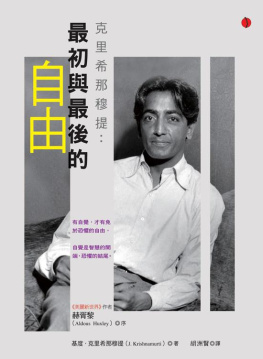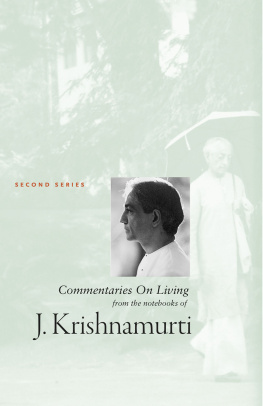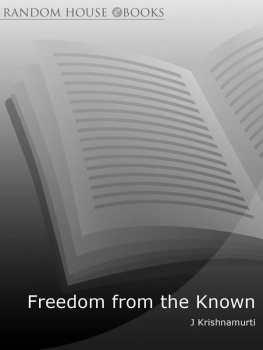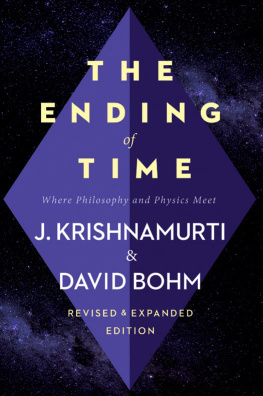Jiddu Krishnamurti - Education as service
Here you can read online Jiddu Krishnamurti - Education as service full text of the book (entire story) in english for free. Download pdf and epub, get meaning, cover and reviews about this ebook. City: Chicago, year: 1912, publisher: Rajput Press, genre: Religion. Description of the work, (preface) as well as reviews are available. Best literature library LitArk.com created for fans of good reading and offers a wide selection of genres:
Romance novel
Science fiction
Adventure
Detective
Science
History
Home and family
Prose
Art
Politics
Computer
Non-fiction
Religion
Business
Children
Humor
Choose a favorite category and find really read worthwhile books. Enjoy immersion in the world of imagination, feel the emotions of the characters or learn something new for yourself, make an fascinating discovery.
- Book:Education as service
- Author:
- Publisher:Rajput Press
- Genre:
- Year:1912
- City:Chicago
- Rating:5 / 5
- Favourites:Add to favourites
- Your mark:
- 100
- 1
- 2
- 3
- 4
- 5
Education as service: summary, description and annotation
We offer to read an annotation, description, summary or preface (depends on what the author of the book "Education as service" wrote himself). If you haven't found the necessary information about the book — write in the comments, we will try to find it.
Education as service — read online for free the complete book (whole text) full work
Below is the text of the book, divided by pages. System saving the place of the last page read, allows you to conveniently read the book "Education as service" online for free, without having to search again every time where you left off. Put a bookmark, and you can go to the page where you finished reading at any time.
Font size:
Interval:
Bookmark:
The Project Gutenberg EBook of Education as Service, by J. Krishnamurti
This eBook is for the use of anyone anywhere at no cost and with
almost no restrictions whatsoever. You may copy it, give it away or
re-use it under the terms of the Project Gutenberg License included
with this eBook or online at www.gutenberg.net
Title: Education as Service
Author: J. Krishnamurti
Release Date: February 27, 2004 [EBook #11345]
Language: English
*** START OF THIS PROJECT GUTENBERG EBOOK EDUCATION AS SERVICE ***
Produced by Juliet Sutherland, and the Online Distributed Proofreading
Team.
THE RAJPUT PRESS
CHICAGO
1912
In long past lives the author of this little book had much to do with educational work, and he seems to have brought over with him an intense interest in education. During his short visits to Benares, he paid an alert attention to many of the details of the work carried on in the Central Hindu College, observing and asking questions, noting the good feeling between teachers and students, so different from his own school experiences in Southern India. He appears to have been brooding over the question, and has, in this booklet, held up the educational ideals which appear to him to be necessary for the improvement of the present system.
The position of the teacher must be raised to that which it used to occupy in India, so that to sit in the teacher's chair will be a badge of social honour. His work must be seen as belonging to the great Teaching Department in the Government of our world, and his relation with his pupils must be a copy of the relation between a Master and His disciples. Love, protective and elevating on the one side, must be met with love, confiding and trustful on the other. This is, in truth, the old Hindu ideal, exaggerated as it may seem to be to-day and if it be possible, in any country to rebuild this ideal, it should be by an Indian for Indians. Hence there is, at the back of the author's mind, a dream of a future College and School, wherein this ideal may be materialiseda Theosophical College and School, because the ancient Indian ideals now draw their life from Theosophy which alone can shape the new vessels for the ancient elixir of life Punishment must disappearnot only the old brutality of the cane, but all the forms of coercion that make hypocrites instead of honourable and manly youths. The teacher must embody the ideal, and the boy be drawn, by admiration and love, to copy it. Those who know how swiftly the unspoiled child responds to a noble ideal will realise how potent may be the influence of a teacher, who stimulates by a high example and rules by the sceptre of love instead of by the rod of fear. Besides, the One Life is in teacher and taught, as Alcyone reminds us, and to that Life, which is Divine, all things are possible.
Education must be shaped to meet the individual needs of the child, and not by a Government Procrustes' bed, to fit which some are dragged well-nigh asunder and others are chopped down. The capacities of the child, the line they fit him to pursue, these must guide his education. In all, the child's interest must be paramount; the true teacher exists to serve.
The school must be a centre of good and joyous influences, radiating from it to the neighbourhood. Studies and games must all be turned to the building of character, to the making of the good citizen, the lover of his country.
Thus dreams the boy, who is to become a teacher, of the possibilities the future may unfold. May he realise, in the strength of a noble Manhood, the pure visions of his youth, and embody a Power which shall make earth's deserts rejoice and blossom as the rose.
ANNIE BESANT.
Many of the suggestions made in this little book come from my own memories of early school life; and my own experience since of the methods used in Occult training has shown me how much happier boys' lives might be made than they usually are. I have myself experienced both the right way of teaching and the wrong way, and therefore I want to help others towards the right way. I write upon the subject because it is one which is very near to the heart of my Master, and much of what I say is but an imperfect echo of what I have heard from Him. Then again, during the last two years, I have seen much of the work done in the Central Hindu College at Benares by Mr. G.S. Arundale and his devoted band of helpers. I have seen teachers glad to spend their time and energies in continual service of those whom they regard as their younger brothers. I have also watched the boys, in their turn, showing a reverence and an affectionate gratitude to their teachers that I had never thought possible.
Though many people may think the ideals put forward are entirely beyond the average teacher, and cannot be put into practice in ordinary schools, I can thus point at least to one institution in which I have seen many of the suggestions made in this book actually carried out. It may be that some of them are, at present, beyond most schools; but they will be recognised and practised as soon as teachers realise them as desirable, and have a proper understanding of the importance of their office.
Most of the recommendations apply, I think, to all countries, and to all religions, and are intended to sound the note of our common brotherhood, irrespective of religion or caste, race or colour. If the unity of life and the oneness of its purpose could be clearly taught to the young in schools, how much brighter would be our hopes for the future! The mutual distrust of races and nations would disappear, if the children were trained in mutual love and sympathy as members of one great family of children all over the world, instead of being taught to glory only in their own traditions and to despise those of others. True patriotism is a beautiful quality in children, for it means unselfishness of purpose and enthusiasm for great ideals; but that is false patriotism which shows itself in contempt for other nations. There are, I am told, many organisations within the various nations of the world, intended to inspire the children with a love for their country and a desire to serve her, and that is surely good; but I wonder when there will be an international organisation to give the children of all nations common ideals also, and a knowledge of the real foundation of right action, the Brotherhood of Man.
I desire to thank my dear mother, Mrs. Annie Besant, for the help she has given me while I have been writing this little book, and also my dear friend, Mr. G.S. Arundalewith whom I have often talked on the subjectfor many useful suggestions.
J. KRISHNAMURTI.
INTRODUCTION
FOREWORD
CONTENTS
THE TEACHER
I. LOVE
II. DISCRIMINATION
III. DESIRELESSNESS
IV. GOOD CONDUCT
- Self-control as to the mind
- Self-control in action
- Tolerance
- Cheerfulness
- One-pointedness
- Confidence
In At the Feet of the Master I have written down the instructions given to me by my Master in preparing me to learn how best to be useful to those around me. All who have read the book will know how inspiring the Master's words are, and how they make each person who reads them long to train himself for the service of others. I know myself how much I have been helped by the loving care of those to whom I look for guidance, and I am eager to pass on to others the help I have obtained from them.
Font size:
Interval:
Bookmark:
Similar books «Education as service»
Look at similar books to Education as service. We have selected literature similar in name and meaning in the hope of providing readers with more options to find new, interesting, not yet read works.
Discussion, reviews of the book Education as service and just readers' own opinions. Leave your comments, write what you think about the work, its meaning or the main characters. Specify what exactly you liked and what you didn't like, and why you think so.

